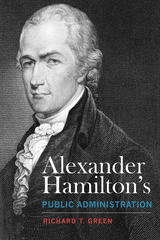
American public administration inherited from Alexander Hamilton a distinct republican framework through which we derive many of our modern governing standards and practices. His administrative theory flowed from his republican vision, prescribing not only the how of administration but also what should be done and why. Administration and policy merged seamlessly in his mind, each conditioning the other. His Anti-Federalist detractors clearly saw this and fought his vision tooth and nail.
That conflict endures to this day because Americans still have not settled on just one vision of the American republic. That is why, Richard Green argues, Hamilton is a pivotal figure in our current reckoning. If we want to more fully understand ourselves and our ways of governing today, we must start by understanding Hamilton, and we cannot do that without exploring his administrative theory and practice in depth.
Alexander Hamilton’s Public Administration considers Hamilton both as a founder of the American republic, steeped in the currents of political philosophy and science of his day, and as its chief administrative theorist and craftsman, deeply involved in establishing the early institutions and policies that would bring his interpretation of the written Constitution to life. Accordingly, this book addresses the complex mix of classical and modern ideas that informed his vision of a modern commercial and administrative republic; the administrative ideas, institutions, and practices that flowed from that vision; and the substantive policies he deemed essential to its realization. Green’s analysis grows out of an immersion in Hamilton’s extant papers, including reports, letters, pamphlets, and essays. Readers will find a comprehensive explanation of his theoretical contributions and a richly detailed account of his ideas and practices in historical context.


A rape victim charges that pornography caused her attacker to become a sex offender. A lesbian mother fights for custody of her child. A transsexual pilot is fired by a commercial airline after undergoing sex change and sues for sex discrimination. A homosexual is denied employment because of sexual orientation. A woman argues that her criminal behavior should be excused because she suffers from premenstrual syndrome. The law has much to say about sexual behavior, but what it says is rarely influenced by the findings of social science research over recent decades. This book focuses for the first time on the dynamic interplay between sexual science and legal decisionmaking.
Reflecting the author's wide experience as a respected sex researcher, expert witness, and lawyer, Sexual Science and the Law provides valuable insights into some of the most controversial social and sexual topics of our time. Drawing on an exhaustive knowledge of the relevant research and citing extensively from case law and court transcripts, Richard Green demonstrates how the work of sexual science could bring about a transformation in jurisprudence, informing the courts in their deliberations on issues such as sexual privacy, homosexuality, prostitution, abortion, pornography, and sexual abuse.
In each case he considers, Green shows how the law has been shaped by social science or impoverished by reliance on conjecture and received wisdom. He examines the role of sexual science in legal controversy, its analysis of human motivation and behavior, and its use by the courts in determining the relative weight to be given the desires of the individual, the standards of society, and the power of the state in limiting sexual autonomy. Unprecedented in its portrayal of sexuality in a legal context, this scholarly but readable book will interest and educate professional and layperson alike—those lawyers, judges, sex educators, therapists, patients, and citizens who find themselves standing nonplussed at the meeting place of morality and behavior.
READERS
Browse our collection.
PUBLISHERS
See BiblioVault's publisher services.
STUDENT SERVICES
Files for college accessibility offices.
UChicago Accessibility Resources
home | accessibility | search | about | contact us
BiblioVault ® 2001 - 2024
The University of Chicago Press









